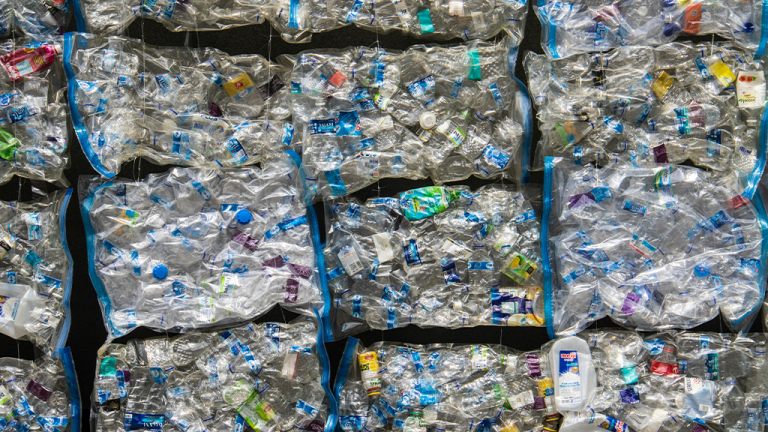In a report titled Recycled Plastic Market – Global Opportunity Analysis and Industry Forecast, 2025-2032 from SkyQuest Technology Consulting, the future of recycled plastics is marked with growth amid tight regulations to control plastic waste disposal and advancements in plastic recycling technologies.
Recycled plastic market key growth drivers
The recycled plastic market is being driven by increasing global awareness of plastic pollution and the enforcement of stringent environmental regulations. Governments and international bodies are mandating plastic recycling targets, banning single-use plastics, and encouraging circular economy initiatives. As environmental compliance becomes essential for brand reputation and regulatory approval, businesses are accelerating the adoption of recycled plastics to meet both legal requirements and consumer expectations.
Packaging, automotive, and consumer goods sectors are rapidly integrating recycled plastic to stay compliant with sustainability trends and regulations. Brands are under increasing pressure to use sustainable materials in response to consumer preferences and corporate social responsibility commitments. Recycled plastics offer a cost-effective and environmentally friendly alternative to virgin resins in applications like bottles, containers, and textiles. Innovations in material quality and processing have improved the appearance and performance of recycled plastics, making them suitable for high-volume, quality-sensitive uses.
Recent developments in the recycled plastic market
Ineos Olefins & Polymers Europe launched recycled plastic production at its Lavera site in June 2025 by utilizing pyrolysis oil made from unrecyclable plastic waste. This initiative enables the creation of virgin-quality polyethylene and polypropylene, certified under the ISCC PLUS scheme. By adapting its cracker to process both traditional and recycled feedstocks, Ineos supports EU regulations requiring 10 percent recycled content in plastic packaging by 2030, advancing circular economy goals and reducing reliance on fossil-based raw materials.
Birch Biosciences signed a global patent license agreement with NREL in June 2025 to commercialize an enzymatic PET recycling technology. This process breaks down PET plastic into high-value monomers, which can be remanufactured into virgin-quality PET for 100 percent recycled content products. Integrated into Birch’s AI-powered recycling platform, the technology enables scalable, low-cost, and energy-efficient recycling, supporting circular economy goals and offering a sustainable alternative to traditional mechanical and chemical recycling methods.
In March 2025, Agilyx and Carlos Monreal launched Plastyx, a joint venture aimed at sourcing 200,000 tonnes of plastic waste feedstock for Europe’s chemical recycling sector by year-end. Agilyx holds a 60 percent stake, with Monreal’s Circular Resources, owning 40 percent. Plastyx will support the production of recycled, food-grade plastics by ensuring a stable supply of high-quality waste for chemical recycling, reinforcing both partners’ commitment to circular economy solutions and expanding Agilyx’s presence in Europe.
Competitive landscape
Many recycled plastic manufacturers are focusing on developing novel plastic recycling technologies and products to stand out from the competition. Collaborating with governments and waste management companies also helps recycling companies enhance output and business scope. Targeting countries with high emphasis on sustainability is slated to be a key strategy among recycled plastic companies.
Major challenges in recycled plastic industry
Inconsistency in quality and performance of recycled materials is a key issue that could hamper the sales of recycled plastic. Mechanical recycling can degrade polymer chains, resulting in weaker structural properties and limited applicability in high-performance or food-grade products. Contamination and mixing of plastic types during collection further reduce material quality. These limitations discourage adoption in industries that require strict specifications or aesthetic standards.
The absence of a proper recycling infrastructure for plastics, especially in emerging economies, is a major restraint that impedes the demand for recycled plastic. Inadequate waste management systems result in high levels of plastic being landfilled or leaked into the environment rather than recovered. The absence of modern recycling facilities and trained personnel limits the supply of high-quality recycled feedstock. Additionally, insufficient public awareness and regulatory enforcement reduce participation in recycling initiatives.
Recycled plastic market segmental analysis
The global recycled plastic market is segmented by product type, source, application, and end user. Based on product type, the market is segmented into polyethylene (PE), (high-density polyethylene (HDPE), low-density polyethylene (LDPE), polyethylene terephthalate (PET), polypropylene (PP), polyvinyl chloride (PVC), polystyrene (PS), and others. Based on source, the market is segmented into bottles, films, fibres, foams, and others. Based on application, the market is segmented into packaging (food and beverage packaging, consumer goods packaging, industrial packaging), building and construction, automotive, electrical and electronics, textiles, and others. Based on end user, the market is segmented into manufacturers, retailers, government bodies, recycling companies, and others.
By product type, the polyethylene (PE) segment dominated the global recycled plastic market in 2024 owing to its extensive use in multiple industry verticals such as packaging and automotive.
By application, the packaging segment dominated the global recycled plastic market in 2024, which can be linked to pressure on packaging companies to make packaging from recycled and sustainable materials.
